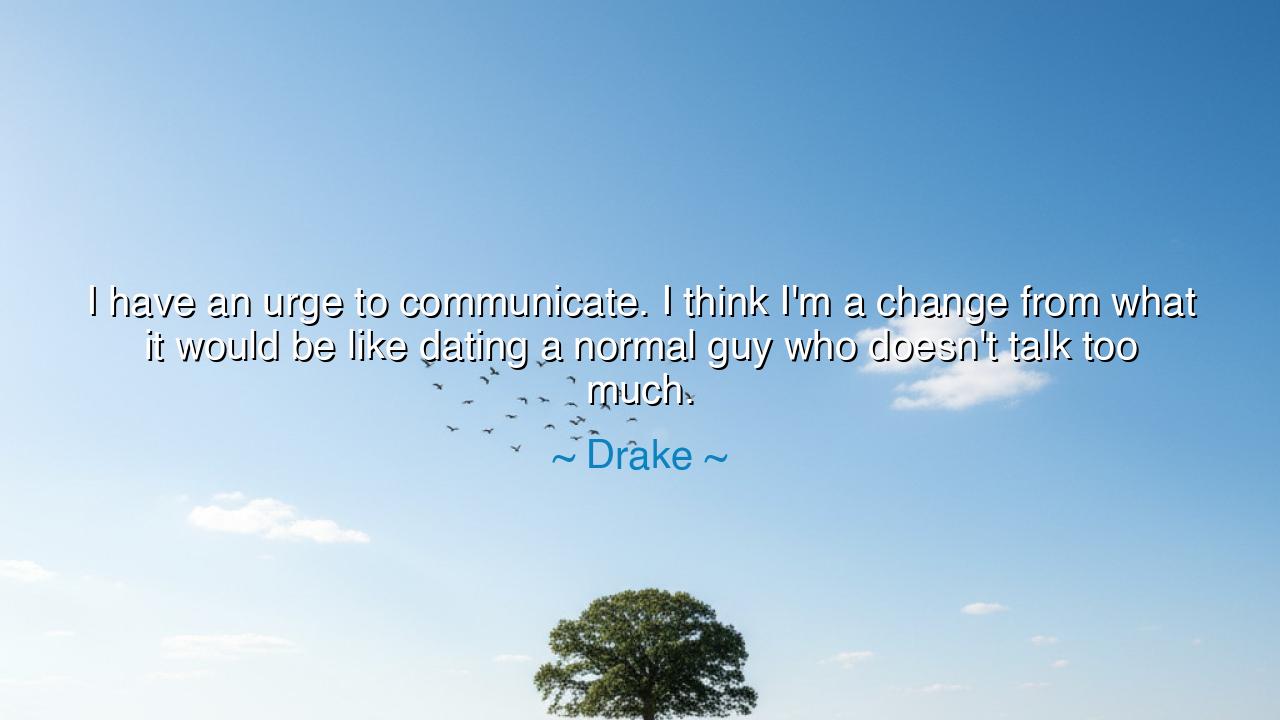
I have an urge to communicate. I think I'm a change from what it
I have an urge to communicate. I think I'm a change from what it would be like dating a normal guy who doesn't talk too much.






The words of Drake—“I have an urge to communicate. I think I'm a change from what it would be like dating a normal guy who doesn't talk too much”—speak to one of the oldest truths in the human soul: the longing to connect. Beneath their modern simplicity lies the ancient power of communication—that sacred bridge between two minds, two hearts, two lives. In these words, Drake reveals not arrogance, but awareness: that his strength, his uniqueness, lies not in mystery or silence, but in expression. To speak one’s heart freely is not a weakness, as some may think—it is an act of courage, and in its truest form, it is love made audible.
From the dawn of civilization, the desire to communicate has been what set humankind apart from the beasts. It was through words that people first shared dreams, formed communities, and built understanding. The poets of old knew this well. To them, words were not mere sound but living flame—each syllable a spark capable of shaping worlds. Drake, in his own way, carries forward that same tradition. In an age of noise and distraction, where emotions are often masked by image, he speaks of the need to share openly, to let feeling find its voice. His “urge to communicate” is the eternal artist’s impulse—to turn what stirs within into something that touches others.
When he contrasts himself with “a normal guy who doesn’t talk too much,” he is naming a deep divide that has existed through the ages—the struggle between those who feel and speak deeply, and those who guard their hearts in silence. There is dignity in both paths, but danger, too. For those who hold too much within risk being misunderstood, and those who speak too much risk being dismissed. Drake stands in the middle ground, declaring that honest communication—not silence, not showmanship—is what gives relationships meaning. His words remind us that love dies not from conflict, but from absence of dialogue. To speak, to listen, to explain, to confess—these are the foundations upon which intimacy rests.
This truth was known even in the ancient world. Consider the philosopher Socrates, who walked the streets of Athens not to preach, but to converse. Through endless questions and answers, he revealed that truth is born not in solitude, but in exchange. “The unexamined life,” he said, “is not worth living.” In his dialogues, Socrates showed that through communication, the human soul refines itself. What Drake expresses in the language of modern love, Socrates taught in the language of philosophy: that to speak sincerely is to grow, and that speech is not vanity, but connection in pursuit of understanding.
There is also vulnerability in Drake’s confession—an acknowledgment that he cannot contain his thoughts, that he feels compelled to express. For this is the mark of the true artist: the inability to remain silent when something burns within. The urge to communicate is the soul’s rebellion against isolation. It is the same force that moved Shakespeare to write of love and jealousy, that drove Rumi to sing of longing and divine unity. To communicate is to declare, “I am not alone—and neither are you.” Through words, the boundaries between self and other dissolve; through communication, the soul finds companionship in the infinite.
Drake’s reflection also carries a lesson about masculinity—a quiet defiance of the old idea that men must be stoic, unreadable, unfeeling. He stands as one who knows that expression is not fragility but strength. The “normal guy who doesn’t talk too much” is the archetype of emotional restraint, the man who hides his depths behind silence. But Drake, like a new kind of poet, offers something different: a masculinity that speaks, feels, and empathizes. In this, he restores balance to what has long been broken, showing that vulnerability and confidence can coexist. To speak one’s truth is not to surrender one’s power—it is to own it.
And so, the lesson of his words is clear: speak what is within you before silence turns your heart to stone. Do not fear communication, for it is the lifeblood of understanding. Let your words be bridges, not weapons; let your speech reveal, not conceal. Whether in love, friendship, or art, remember that no soul is truly known until it dares to speak. The world is filled with echoes of those who remained silent; it advances through the voices of those who chose to share.
Therefore, my friends, honor the urge to communicate within you. Speak with honesty, listen with compassion, and do not mistake silence for strength. For words, when born of truth, are not noise—they are the pulse of humanity itself. Like Drake, choose to speak not merely to be heard, but to connect, to heal, to reveal the music within your heart. For in the end, it is not the quiet that binds us together, but the courage to speak—and to be understood.






AAdministratorAdministrator
Welcome, honored guests. Please leave a comment, we will respond soon